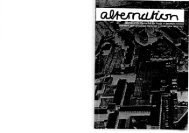Re-reading The Purloined Letter - Alternation Journal
Re-reading The Purloined Letter - Alternation Journal
Re-reading The Purloined Letter - Alternation Journal
You also want an ePaper? Increase the reach of your titles
YUMPU automatically turns print PDFs into web optimized ePapers that Google loves.
Pravina Pillay<br />
Derrida, whose own debt to psychoanalysis is profound. In a 1975 essay on<br />
Lacan’s Poe Seminar called Le facteur de la Verite (<strong>The</strong> Postman/Factor of<br />
Truth), Derrida critiques Lacan’s seminar on <strong>The</strong> <strong>Purloined</strong> <strong>Letter</strong> the<br />
following reasons: Lacan’s failure to make reference to the author (Poe) in<br />
his literary analysis, his exclusion of the narrator from intersubjective triads,<br />
his overlooking the formal structure of the text, his emphasizing and looking<br />
at the text in isolation without mentioning the Dupin trilogy; his postulation<br />
of castration as a factor of ultimate truth—here his objection is not to<br />
castration itself but rather to its promotion as ‘transcendental signifier’ and<br />
Lacan’s assertion that a letter always arrives at its destination. Thirdly, I<br />
examine Žižek’s defense of Lacan. Žižek pays special attention to Lacan’s<br />
thesis that ‘a letter always arrives at its destination’. He attempts to give<br />
credibility to this by drawing on the triad of the Symbolic, <strong>Re</strong>al and<br />
Imaginary.<br />
Lacan’s <strong>Re</strong>ading of <strong>The</strong> <strong>Purloined</strong> <strong>Letter</strong><br />
One of Lacan’s most well-known excursions into literary criticism is his<br />
seminar on Poe’s <strong>The</strong> <strong>Purloined</strong> <strong>Letter</strong> in which he focuses on the<br />
conjunction and the interdependence of the concepts of castration, the<br />
phallus, sexual difference, signification and the symbolic. As a classic piece<br />
of Lacanian criticism, it has attracted much interest. Before attempting a<br />
critique of Lacan’s <strong>reading</strong> of <strong>The</strong> <strong>Purloined</strong> <strong>Letter</strong> I will give a brief<br />
synopsis of the text.<br />
<strong>The</strong> story concerns the quest to retrieve a letter received by and then<br />
stolen from the Queen, the potentially compromising contents of which are<br />
veiled. <strong>The</strong> King enters her boudoir; in order to conceal the letter from him,<br />
the Queen places in on a table to make it appear innocent. <strong>The</strong> duplicitious<br />
Minister D- enters and perceiving the letter’s importance, substitutes another<br />
for it, purloining the original and attaining political power over the Queen by<br />
virtue of his possession, a power based on ‘the robber’s knowledge of the<br />
loser’s knowledge of the robber’ (Poe, Selected Writings 1984:371). This is<br />
the story’s ‘primal scene’. <strong>The</strong> Queen must retrieve the letter in order to be<br />
released from this compromising position, and so the Prefect of Police is<br />
called in. In secret, his officers microscopically scour the Minister’s<br />
apartment, and when they fail to locate the letter, the detective Dupin is<br />
370

















